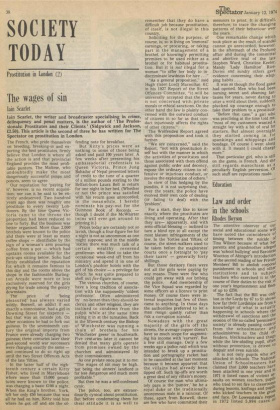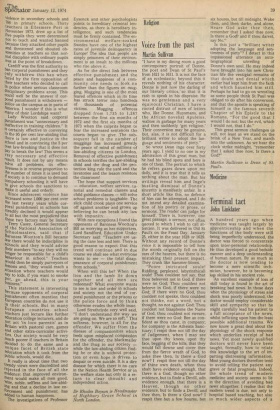Education
Law and order in the schools
Rhodes Boyson
The attentive observer of our social and educational scene have noted the coincidence 01 timing between the suicide of Tina Wilson because of what her parents and grandmother alleged was 'school bullying' and Baroness Wootton of Abinger's introduction of the second reading of her Private Members' Bill to abolish corporal punishment in schools and other institutions and to subject teachers who exercised it in the course of their duties to the risk Of one year's imprisonment and fines of up to £250. The fact that the Bill was onlY lost in the Lords by 67 to 51 shovis how far their Lordships are from a knowledge of what is actually happening in schools where the withdrawal of sanctions and the erosion of the so-called 'permissive society' is already passing control from the schoolmaster atid schoolmistress to the child offenders, blackmailers and thugs while the law-abiding pupil, often without protection, is driven ta despair and even suicide. It is not only pupils who are, attacked in schools. The National Union of Schoolmasters has claimed that 2,000 teachers hav,e been attacked in one year and ill 1971 it listed cases of vicious as,' saults on women teachers, pupils who tried to set fire to classrooms during lessons, knifings and puPl,ls who kicked teachers in the groin and face. Dr Lowenstein's report,. in 1972 listed 5,994 cases 0 violence in secondary schools and NS in primary schools. Thirty teachers in Ellesmere Port in November 1973, drew up a list of five pupils they were determined not to teach and wanted banned because they attacked other pupils and threatened and shouted obscenities at teachers so that normal discipline with ordinary pupils was at the point of breakdown.
Cardiff was the first authority to ban corporal punishment and they only withdrew this ban when faced by the firm opposition of their teachers who decided to call In police when serious classroom disciplinary problems arose. This could well be the answer if cor poral punishment is withdrawn — Police on the campus as in parts of America. I wonder if this is what Many of their Lordships want? Lady Wootton said coporal punishment was "unnecessary and ineffective in training children." It Is certainly effective in conveying to the 95 per cent law-abiding that there is law and justice in the school and in convincing the 5 per cent law-breaking that it does not Pay to break the law! This seems a very necessary and effective result. It does not by any means solve all problems, its effectiveness is in reverse proportion to the number of times it is used but If society is to continue to demand compulsory schooling it will have to give schools the sanctions to Make it useful and orderly. Since adolescent violence has Increased some 1,000 per cent over the last twenty years while corPoral punishment in schools has steadily declined it would appear to all but the most prejudiced that these two factors may be linked. Terry Casey, General Secretary Of the National Association of Schoolmasters, said that if Baroness Wootton's Bill became law there would be indiscipline in schools and they would advise their members "to say they will no longer be responsible for a child's behaviour in school." Teachers Would then be simply purveyors ot lessons and, "they would reach a situation where teachers would Say to kids, if you want to smoke Pot, go ahead, this is your business."
This statement is interesting because opponents of corporal Punishment often mention that European countries do not use it In their schools. But in many European countries school teachers just lecture like further education college lecturers, and do not act 'in loco parentis' as in Britain with pastoral care, games and other extra-curricular activities. Our society would be very Much poorer if teachers in Britain decided to do the same and a unique facet of British state education which it took from the Public schools, would die.
It really is about time that two trendy views were discredited and rejected in the face of all the evidence: that improved environment would make all men good, Wise, noble, selfless and law-abiding and that a decline in Jaw enforcement and punishment has added to human happiness. The investigations of Professor Eysenck and other psychologists points to hereditary criminal tendencies, as there is hereditary intelligence, and such tendencies must be firmly contained. The environmental welfare-soaked Swedes have one of the highest rates of juvenile delinquency in Europe! The idea that people are simply prisoners of their environment is an insult to the millions who rise above it.
As for the direct link between effective punishment and the peace and happiness of a community one needs to look no further than the figures on mugging. Mugging is one of the most feared offences which in its time has struck terror into hundreds of thousands of potential victims. Mugging offences dropped from 1,735 to 1,287 between the first six months of 1972 and the first six months of 1973 when the culprits began to fear the increased sentences the courts began to give. The subsequent fall in the number of muggings has increased greatly the peace of mind of millions of law-abiding citizens in London. Removal of effective punishment in schools terrifies the law-abiding child and the thug and the protection king rule the yard and the lavatories and the lesson resistors the classroom!
The hope that support services — education, welfare services, tutorial and remedial classes and child guidance classes — will solve school problems is laughable. The slick child crook plays one service off against another and grows up believing he can break any law with impunity.
With rare exceptions I found the opponents of Baroness Wootton's Bill as worrying as her supporters. Lord Sandford, Education Under Secretary said: "Teachers are using the cane less and less. There is good reason to expect that this trend will continue and in due course we shall see what everyone wants to see — the total disappearance of corporal punishment from schools."
When will this be? When the lion and the lamb lie down together and all men are redeemed? What everyone wants to see is law and order in schools and society not the end of corporal punishment or the prisons or the police force and to think otherwise evades the whole issue.
Lord Strathclyde very well said, "I don't understand the way we are going on. We are so soft." This softness, however, is all for the offender. We suffer from the disease of compassionities which feeds upon misplaced compassion for the offender, the blackmailer and the thug in our society — while the law-abiding citizen finding he or she is without protec
tion or even hope is driven to despair or even suicide. It is a dire disease for which there is no cure in the Nation Health Service or in the welfare state but only in a return to clear thought and independent action.
Dr Rhodes Boyson is Headmaster of Highbury Grove School in North London.



































 Previous page
Previous page